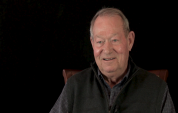4:08 | Mike McCormick always wanted to be a soldier and an officer, but after two years of college, he became restless and left school for a job with the FBI. The lure of the military was strong, though, and he returned to the ROTC program at Western Kentucky University.
Keywords : Mike McCormick Adairville KY Bowling Green KY Western Kentucky University Federal Bureau of Investigation (FBI) J. Edgar Hoover Reserve Officer Training Corps (ROTC) Pershing Rifles

His first duty station was in Hawaii with the 125th Signal Battalion. After 16 months there, Mike McCormick took a troop ship to Vietnam, which kind of ruined the cruise as a vacation choice for him. He was stationed at Cu Chi, famed for its Viet Cong tunnels.
At a certain point during his first tour of Vietnam, Mike McCormick reached two years of duty in the signal field and was sent to military intelligence. Despite a lack of formal training, he ran the counterintelligence branch and their first order of business was the vetting of all the Vietnamese workers on base.
For Mike McCormick, who worked in counterintelligence in Vietnam, there was a lot of time spent outside the wire in small teams, tracking down and apprehending VC and NVA agents. He could have easily qualified for an Air Medal with all the time spent on choppers doing this. The unit recovered some documents that proved the Michelin plantation was paying protection money to the Viet Cong.
If you were smart, you could avoid the booby traps, but what you couldn't avoid were the questionable tactics. Mike McCormick wanted to know why they were going back to the same piece of land over and over, taking casualties and then leaving. The brash young lieutenant got no real answer.
Mike McCormick remembers Christmas of 1966, celebrated in the first permanent structure completed at the new base camp in Vietnam, the chapel. They were treated to a show with Bob Hope and other celebrities.
When he was a young lieutenant, Mike McCormick had an embarrassing incident during an inspection by the commanding general which caused the general to remember him in a lighthearted way.
Fortunately, Mike McCormick did not encounter any of the dangerous wildlife in Vietnam. Death found you easily enough at the end of a Viet Cong rifle. The enemy, though, had to deal with the massive power of a B-52 strike.
Mike McCormick gives his honest assessment of what went wrong in Vietnam. Although we could have easily prevailed by doing what the leadership was unwilling to do, for him the greater mistake was allowing the French to re-assert their colonial power there after World War II.